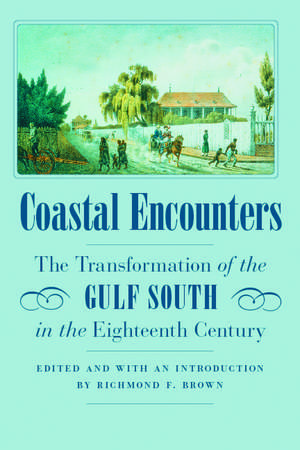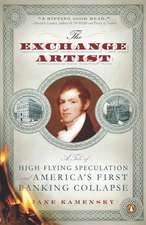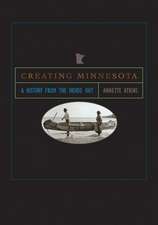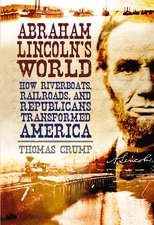Coastal Encounters: The Transformation of the Gulf South in the Eighteenth Century
Editat de Richmond F. Brownen Limba Engleză Paperback – 2008
Coastal Encounters opens a window onto the fascinating world of the eighteenth-century Gulf South. Stretching from Florida to Texas, the region witnessed the complex collision of European, African, and Native American peoples. The Gulf South offered an extraordinary stage for European rivalries to play out, allowed a Native-based frontier exchange system to develop alongside an emerging slave-based plantation economy, and enabled the construction of an urban network of unusual opportunity for free people of color. After being long-neglected in favor of the English colonies of the Atlantic coast, the colonial Gulf South has now become the focus of new and exciting scholarship.
Coastal Encounters brings together leading experts and emerging scholars to provide a portrait of the Gulf South in the eighteenth century. The contributors depict the remarkable transformations that took place—demographic, cultural, social, political, and economic—and examine the changes from multiple perspectives, including those of Native Americans, Europeans, and Africans; colonizers and colonized; men and women. The outstanding essays in this book argue for the central place of this dynamic region in colonial history.
Preț: 184.95 lei
Nou
Puncte Express: 277
Preț estimativ în valută:
35.39€ • 36.82$ • 29.22£
35.39€ • 36.82$ • 29.22£
Carte tipărită la comandă
Livrare economică 12-26 aprilie
Preluare comenzi: 021 569.72.76
Specificații
ISBN-13: 9780803262676
ISBN-10: 0803262671
Pagini: 328
Ilustrații: 6 maps, 2 figures, 17 tables, index
Dimensiuni: 152 x 229 x 15 mm
Greutate: 0.45 kg
Editura: Nebraska Paperback
Colecția University of Nebraska Press
Locul publicării:United States
ISBN-10: 0803262671
Pagini: 328
Ilustrații: 6 maps, 2 figures, 17 tables, index
Dimensiuni: 152 x 229 x 15 mm
Greutate: 0.45 kg
Editura: Nebraska Paperback
Colecția University of Nebraska Press
Locul publicării:United States
Notă biografică
Richmond F. Brown is an associate professor and associate director of the Center for Latin American Studies at the University of Florida. He taught at the University of South Alabama for sixteen years, where he organized the Howard Mahan Symposium. He is the author of Juan Fermin de Aycinena: Central American Colonial Entrepreneur, 1729–1796.
Contributors include:
Armando C. Alonzo
Ida Altman
Richmond F. Brown
H. Sophie Burton
Amy Turner Bushnell
Karl Davis
Shannon Lee Dawdy
Virginia Gould
Jane Landers
Andrew McMichael
Greg O’Brien
Daniel H. Usner Jr.
David Wheat
Contributors include:
Armando C. Alonzo
Ida Altman
Richmond F. Brown
H. Sophie Burton
Amy Turner Bushnell
Karl Davis
Shannon Lee Dawdy
Virginia Gould
Jane Landers
Andrew McMichael
Greg O’Brien
Daniel H. Usner Jr.
David Wheat
Cuprins
<CT>Contents</CT>
List of Illustrations
Preface
1. Introduction
Richmond F. Brown
2. The Significance of the Gulf South in Early American History
Daniel H. Usner Jr.
3. Escape of the Nickaleers: European-Indian Relations on the Wild Coast of Florida in 1696, from Jonathan Dickinson's Journal
Amy Turner Bushnell
4. Supplying Our Wants: Choctaws and Chickasaws Reassess the Trade Relationship with Britain, 1771-72
Greg O'Brien
5. The Founding of Tensaw: Kinship, Community, Trade, and Diplomacy in the Creek Nation
Karl Davis
6. A Nation Divided? Blood Seminoles and Black Seminoles on the Florida Frontier
Jane G. Landers
7. My Friend Nicolas Mongoula: Africans, Indians, and Cultural Exchange in Eighteenth-Century Mobile
David Wheat
8. Scoundrels, Whores, and Gentlemen: Defamation and Society in French Colonial Louisiana
Shannon Lee Dawdy
9. Afro-Creole Women, Freedom, and Property-Holding in Early New Orleans
Virginia Meacham Gould
10. Spanish Bourbons and Louisiana Tobacco: The Case of Natchitoches, 1763-1803
H. Sophie Burton
11. A History of Ranching in Nuevo Santander's Villas del Norte, 1730s<EN>1848
Armando C. Alonzo
12. Maintaining Loyalty in the West Florida Borderlands: Land as Cause and Effect in the West Florida Revolution of 1810
Andrew McMichael
13. Afterword
Ida Altman
Notes
Bibliography
Contributors
Index
List of Illustrations
Preface
1. Introduction
Richmond F. Brown
2. The Significance of the Gulf South in Early American History
Daniel H. Usner Jr.
3. Escape of the Nickaleers: European-Indian Relations on the Wild Coast of Florida in 1696, from Jonathan Dickinson's Journal
Amy Turner Bushnell
4. Supplying Our Wants: Choctaws and Chickasaws Reassess the Trade Relationship with Britain, 1771-72
Greg O'Brien
5. The Founding of Tensaw: Kinship, Community, Trade, and Diplomacy in the Creek Nation
Karl Davis
6. A Nation Divided? Blood Seminoles and Black Seminoles on the Florida Frontier
Jane G. Landers
7. My Friend Nicolas Mongoula: Africans, Indians, and Cultural Exchange in Eighteenth-Century Mobile
David Wheat
8. Scoundrels, Whores, and Gentlemen: Defamation and Society in French Colonial Louisiana
Shannon Lee Dawdy
9. Afro-Creole Women, Freedom, and Property-Holding in Early New Orleans
Virginia Meacham Gould
10. Spanish Bourbons and Louisiana Tobacco: The Case of Natchitoches, 1763-1803
H. Sophie Burton
11. A History of Ranching in Nuevo Santander's Villas del Norte, 1730s<EN>1848
Armando C. Alonzo
12. Maintaining Loyalty in the West Florida Borderlands: Land as Cause and Effect in the West Florida Revolution of 1810
Andrew McMichael
13. Afterword
Ida Altman
Notes
Bibliography
Contributors
Index
Recenzii
"A remarkable addition to regional studies on the colonial Gulf South."—H. G. Kong, CHOICE
"Largely ignored by colonial historians, the eighteenth-century Gulf South shines in this rich new collection of essays by a dozen experts and new scholars."—Tammy L. Ingram, Historian














